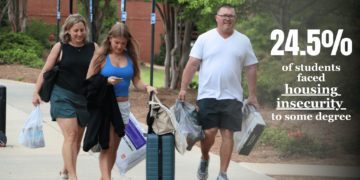Between switching to telemental health and brainstorming new events, students and faculty alike have been working to adapt the University Counseling Center to the pandemic, but counselors are facing challenges with treating patients virtually.
Bud Edwards, director of the UCC, said the counseling center redesigned the service delivery model to incorporate the telemental health option as a result of the coronavirus, but for many out-of-state students, receiving its services has been impossible.
Counseling licenses restrict counselors to practice only in the state they received their license. Counselors would either have to obtain a temporary or permanent license if they wanted to continue counseling out-of-state students, according to Edwards.
“We had to refer (out-of-state) students to local providers,” Edwards said. “So in the spring, that’s what we (did). We lost a lot of student appointments in the spring when COVID hit because we have such a high percentage of students from out-of-state students.”
Edwards said the time it takes to obtain temporary licenses could range from two weeks to a month. From a therapeutic standpoint, he said it makes more sense to refer out-of-state students to local services than to have counselors constantly renewing temporary licenses.
“If that student is going to need more than a month’s worth of treatment, then we would have to renew that license, and we wouldn’t be able to start providing that service until we got the temporary license,” Edwards said.
Junior biological science major Kate Camillo has been using the psychological services center since last year, and she said that the UCC did a great job both transitioning into using Zoom over the spring semester and the summer. She also said the center has been very accommodating for students.
“I feel like they did a really good job, especially over quarantine and this summer to get into contact with everyone that had been using the services,” Camillo said. “They also did not charge me for any of my sessions for the entire quarantine and almost the entire summer. I thought that showed how much they actually cared about making sure everyone was okay, not that they were worried about money or logistics.”
Students who use the UCC’s services are allowed up to 10 visits each school year.
Livie Ruhl, co-director of Active Minds, said that the coronavirus interfered with a lot of their plans for the year. Active Minds, a student organization, raises awareness and education on mental health for young adults.
However, Ruhl said that Active Minds and the Associated Student Body are working together on an event called Movies for Mental Health, an idea they found from a non-profit group called Art with Impact.
“We are planning on teaming with (Art with Impact) to host Movies for Mental Health, which is a virtual presentation of short films highlighting mental health struggles. When the film is playing, students who register will be able to actually type in a chat room anonymously to express their feelings towards the film or just anything in general,” Ruhl said. “We are working on getting a panel of Ole Miss students to participate in a panel after the films are shown to help break the stigma around mental health.”
Hays Dubberly, a former candidate for Mr. Ole Miss, ran on a platform advocating for mental health awareness. Dubberly sold t-shirts for his campaign and raised $1,600 to donate to the William Magee Center. Previous candidates for homecoming titles, like 2018 Miss Ole Miss Jessica Tran, have run on similar platforms.
“This has been a difficult year for many Ole Miss students, particularly freshmen that do not know have the opportunity to meet people like students in past semesters,” Dubberly wrote in a statement to The Daily Mississippian. “This campaign is not about me; this is about promoting health and wellness to fellow Ole Miss students.”
Dubberly wrote that he is concerned about the social stigma with depression because people don’t want to seem weak when talking about mental illness.


























